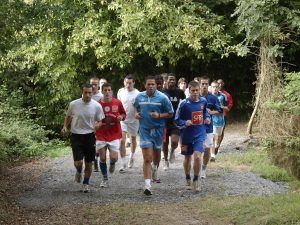Plan your Optimal Footing: 3 tips to prepare for a Football Detection
When preparing for a soccer detection, training is essential – and jogging is an integral part of it. It’s important to plan your jogging well. Endurance, speed and agility are key skills for any footballer, and a good jogging program can help you develop them. But when is the best time to go jogging? Here are a few tips to help you plan your training.

Contents
Why is jogging important?
Jogging, or running, is a form of cardiovascular exercise that helps strengthen the heart, improve endurance and increase speed. For a footballer, these skills are invaluable. A good level of endurance can make the difference between maintaining a high level of performance throughout a match or burning out in the final minutes. What’s more, speed and agility can help you outpace your opponents on the pitch.
When is the right time to jog?
The ideal time to go jogging depends on a number of factors, including your schedule, fitness level and training goals. However, here are some key times to consider:
Morning: Jogging in the morning can be a great way to start the day. It boosts your metabolism, improves your mood and can help you feel more energetic throughout the day. What’s more, morning exercise has been shown to improve concentration and productivity.
Afternoon: If you’re not a morning person, running in the afternoon can be a good option. Your body has had time to wake up, and you’ll probably have eaten a meal or two, giving you the energy you need for a good workout.
Evening: Running in the evening can be a good way to decompress after a busy day. However, make sure you don’t run too close to bedtime, as exercise can sometimes make it difficult to fall asleep.
How do I plan my jog?
When planning your jogging program, it’s important to take into account your current fitness level and your training goals. If you’re new to jogging, start slowly and gradually increase your distance and speed. It’s also important to plan rest days to allow your body to recover.
The importance of warming up and cooling down
Before you start jogging, it’s crucial to warm up properly. A proper warm-up prepares your body for exertion and reduces the risk of injury. Start with a few minutes of brisk walking or light jogging, followed by dynamic stretching targeting the main muscle groups you’ll be using during your run.
Similarly, don’t neglect the cool-down phase after your jog. This helps reduce the build-up of lactic acid, which can cause muscle soreness, and promotes faster recovery. Finish your jog with a slow walk or light jog, then do some static stretching to help relax your muscles.
Nutrition and hydration
Nutrition and hydration also play a key role in your preparation for a soccer detection. Before your run, try to eat a meal rich in carbohydrates to provide you with the energy you’ll need. After your run, opt for a balanced meal or snack containing protein to aid muscle recovery.
Staying hydrated is also crucial, especially if you’re running in hot weather. Drink water before, during and after your run to maintain your hydration levels. If your jog lasts longer than an hour, you may want to consider a sports drink that contains electrolytes to help replace what you lose through sweat.
Integrating jogging into a broader training program
Although jogging is an important part of your preparation for a soccer detection, it should be part of a broader training program. This could include strength training sessions to develop your power and stamina, technical exercises to improve your soccer skills, and flexibility and recovery sessions to help prevent injury.
An example of a broader weekly training program might be as follows:
Monday: Slow jogging + strength training
Tuesday: Technical training
Wednesday: Medium-intensity jogging + strength training
Thursday: Technical session
Friday: Fast jogging + flexibility and recovery session
Saturday: Complete rest
Sunday: Long run + technical session
It’s also essential to listen to yourself and rest if you need to. Overtraining can increase the risk of injury and harm your performance in the long term.
Conclusion
Planning and executing your jogging optimally is an essential step in preparing for a soccer detection. Taking into account the above-mentioned elements and adapting them to your specific needs and objectives.